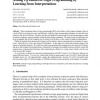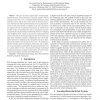11 search results - page 1 / 3 » Inductive Logic Programming for Structure-Activity Relations... |
SAINT
2005
IEEE
13 years 10 months ago
2005
IEEE
Inductive Logic Programming (ILP) is a combination of inductive learning and first-order logic aiming to learn first-order hypotheses from training examples. ILP has a serious b...
CORR
2000
Springer
13 years 4 months ago
2000
Springer
When comparing inductive logic programming (ILP) and attribute-value learning techniques, there is a trade-off between expressive power and efficiency. Inductive logic programming ...
EUSFLAT
2009
13 years 2 months ago
2009
Abstract-- This paper presents an approach for visualizing highdimensional fuzzy rules arranged in a hierarchy together with the training patterns they cover. A standard multi-dime...
ILP
2004
Springer
13 years 10 months ago
2004
Springer
Many domains in the field of Inductive Logic Programming (ILP) involve highly unbalanced data. Our research has focused on Information Extraction (IE), a task that typically invol...
BMCBI
2006
13 years 4 months ago
2006
Background: Microarrays used for gene expression studies yield large amounts of data. The processing of such data typically leads to lists of differentially-regulated genes. A com...


